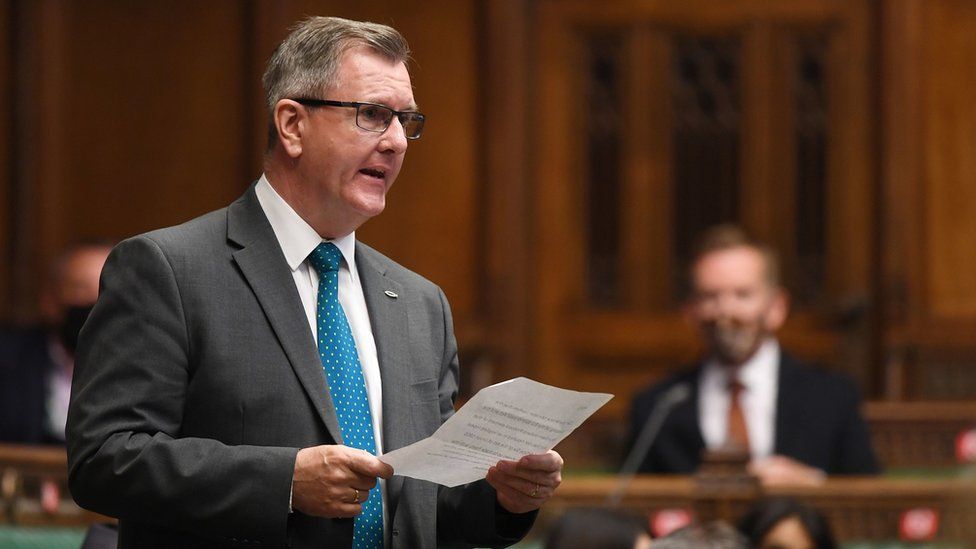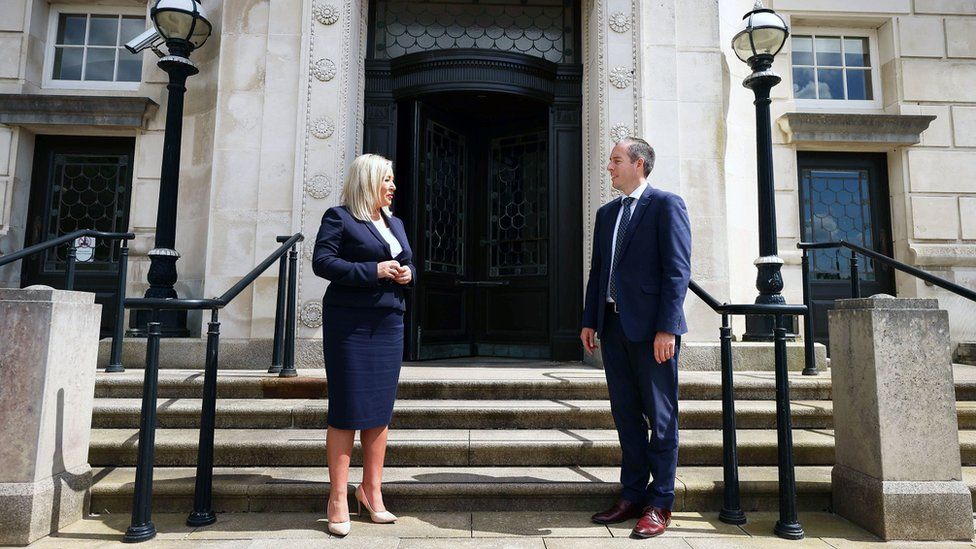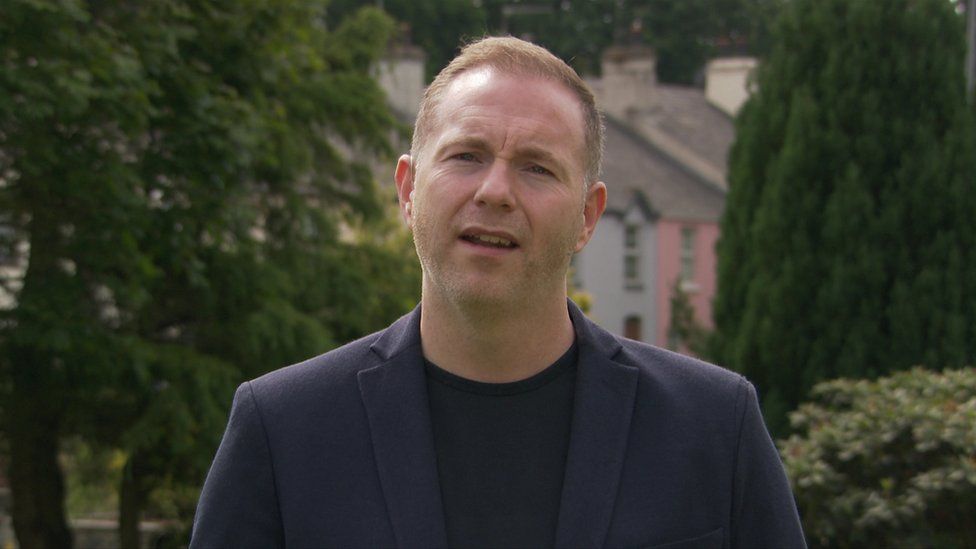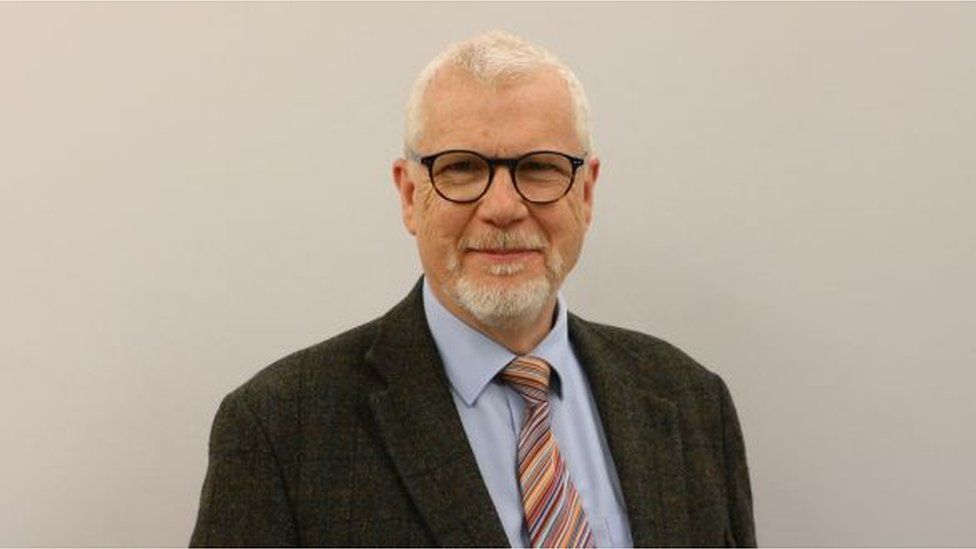DUP leadership: Donaldson favourite as nominations openon June 20, 2021 at 10:12 am
Sir Jeffrey Donaldson has made it clear he intends to lead the party from Stormont as first minister.

image copyrightUK Parliament/Jessica Taylor
Nominations for the post of Democratic Unionist Party (DUP) leader have opened.
Lagan Valley MP Sir Jeffrey Donaldson is favourite to take the top post and has made it clear he would lead the party from Stormont as first minister.
It follows the resignation of Edwin Poots on Thursday after just three weeks.
Mr Poots faced an internal party revolt after he agreed a deal with Sinn Féin and nominated a first minister.
This came after Westminster vowed to push through Irish language legislation in October, if Stormont fails to do so beforehand.
DUP party officers have set a date of 26 June to elect a new leader, if there is more than one candidate.
Potential new leaders must submit in writing their nomination, supported by a proposer and seconder, to DUP chairman Lord Morrow before noon on Tuesday.
Only MLAs and MPs are entitled to vote if there is a leadership contest.
Sir Jeffrey ran against Mr Poots for the party leadership a number of weeks ago and was defeated by just two votes.

image copyrightKelvin Boyes/Press Eye/PA Wire
Mr Poots took over in May amid internal tensions about the direction his leadership would take and the manner of the departure of his predecessor Arlene Foster.
He had nominated Paul Givan to replace Mrs Foster, while Sinn Féin said Michelle O’Neill would resume her post as deputy first minister.
But Sinn Féin had wanted commitments from the DUP over a timetable for implementing Irish language legislation, as set out in the New Decade, New Approach (NDNA) deal that restored power sharing in January 2020.
The party said this was not forthcoming, and it called on NI Secretary Brandon Lewis to bring in Irish language legislation via Westminster.
Mr Poots had said he was committed to implementing all of the NDNA commitments, including those around Irish language, but not necessarily before the end of the current assembly mandate in May 2022.
Last week, a deal was struck between the two parties and the secretary of state that would see Westminster legislate for Irish language commitments in October, if it had not happened at Stormont.
DUP MPs and peers wrote to Mr Poots expressing concern about the deal and subsequently opposed the nomination of Mr Givan as first minister.
Mr Givan looks set to be the shortest serving leader to hold the post. He has been informed by DUP officers that he will have to step down when the new leader takes over.
When he resigns that will once more will see Sinn Féin’s Michelle O’Neill removed as deputy first minister, as it is a joint office, and the DUP and Sinn Féin will then again have seven days to fill the roles.

The Sunday Life has reported that Sir Jeffrey, if he becomes DUP leader, will not nominate a first minister unless there is “significant change in the plans to bring in Irish language laws”.
Sinn Féin’s South Down MP Chris Hazzard told BBC NI’s Sunday Politics there was “no basis to power-sharing unless people keep to their word”.
“We simply this week had a British government announce that they would implement what the DUP agreed 15 months ago, that they would implement what they agreed 15 years ago.
“Irish language rights will be delivered this mandate and that’s because Sinn Féin went around the DUP. In 2017, when we said there would be no return to the status quo we meant what we said.”

image copyrightPresbyterian Church in Ireland
The moderator of the Presbyterian Church in Ireland, The Reverend David Bruce, has urged politicians not to allow issues over the Irish language to derail devolution.
He told BBC Radio Ulster’s Sunday Sequence programme last week had been a “political soap opera with cliff hanger following cliff hanger”.
“If we find ourselves preoccupied with the fragility of the assembly, that means important work may not be done – such as addressing educational under-achievement, waiting lists in the NHS, youth and disability service funding and revitalising communities.”
He added that the Irish language held “no threat to me as a Presbyterian – quite the reverse in fact – within our tradition the Irish language has been important to us, indeed it has been said Presbyterians were part of the rescue of the Irish language in the 18th Century”.
“It is associated with nationalism, sometimes republicanism, and therefore is antithetic to unionism and I would say: ‘Let’s get past the symbolism.’
“It ought not to be a threat to our work or identity in my view since we are an all-Ireland church.”
